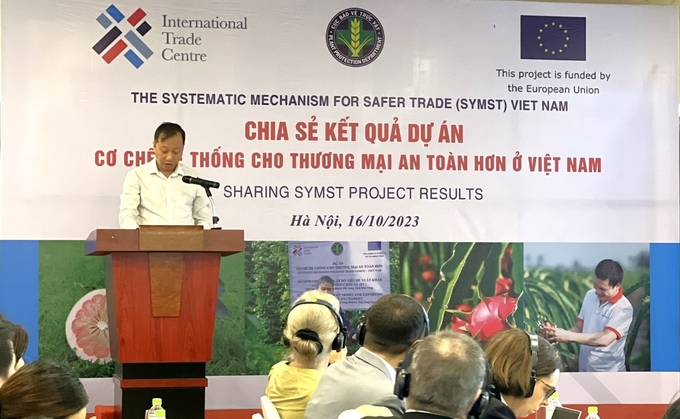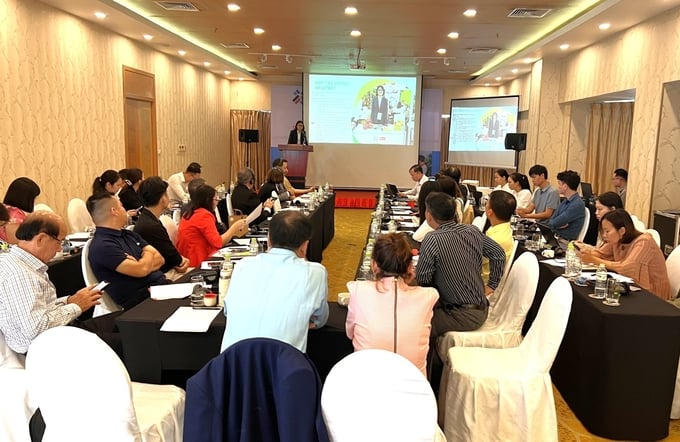November 23, 2025 | 23:53 GMT +7
November 23, 2025 | 23:53 GMT +7
Hotline: 0913.378.918
November 23, 2025 | 23:53 GMT +7
Hotline: 0913.378.918

The SYMST project has been implemented in Vietnam since May 2020 and has achieved many very positive results to date. Photo: Trung Quan.
On October 16, the Plant Protection Department (Ministry of Agriculture and Rural Development) coordinated with the International Trade Center (ITC) to organize the Workshop "Sharing results of the project on systematic mechanisms for safer trade in Vietnam” (SYMST project).
Mr. Nguyen Quang Hieu, Head of the Department of International Cooperation and Communications (The Plant Protection Department), said that the EU has become one of the most attractive markets for Vietnamese agricultural products, including fruits and vegetables. Vietnam also clearly understands that the EU is in the group of markets with the world's highest imported food management standards, with very detailed and strict rules to protect consumer health, animals and plants, and the environment.
The Plant Protection Department, as Vietnam's national plant protection agency, is coordinating with ITC to implement the project "Systemic Mechanism for Safer Trade in Vietnam" funded by the European Union (EU), aiming to Improve national capacity when addressing food safety and plant health issues in the production and export of agricultural products of plant origin.
According to Mr. Hieu, understanding EU management requirements on food safety and plant health is the key to successfully accessing the EU market. Therefore, one of the most important activities of the SYMST project in Vietnam is to focus on disseminating information and raising awareness about plant health and pesticides when exported from Vietnam to the EU.
The SYMST project has been implemented in Vietnam since May 2020. Experiencing difficult times due to the negative impact of the COVID-19 pandemic, the Plant Protection Department has actively coordinated with ITC and related units to strive to complete the project's tasks. Thanks to that, the project has achieved many very positive results.

According to the Plant Protection Department, understanding EU management requirements on food safety and plant health is the key to successfully accessing the EU market. Photo: Trung Quan.
Specifically, the project has raised awareness and knowledge of the private sector and state management agencies on plant quarantine and food safety issues. Besides, it improves the system's performance in managing and controlling components participating in the production chain of exported plant-based products. Simultaneously, expand market access and business connection opportunities for Vietnamese agricultural export enterprises, especially for the EU market.
The three target products of the project are grapefruit, dragon fruit, and pepper, all of which are intense fruits of Vietnam, so the project's beneficiaries are enormous.
The International Trade Center (ITC) is the implementing unit of the SYMST project funded by the EU. This project develops a systematic approach to support two countries in the ASEAN region (Laos and Vietnam) to implement food safety and plant health management measures in the fruit and vegetable industry and management measures for other plant products.
The project aims to support plant health, pesticide use, and controlling fruits and vegetables and other plant product supply chains. The Plant Protection Department is Vietnam's National Plant Protection Organization (NPPO). In the SYMST project, the Plant Protection Department is the Vietnamese side's focal point.
Evaluating the SYMST project, Mrs. Nguyen Thi Thu Huong, Deputy Director of the Plant Protection Department, said that one of the most essential activities of the SYMST project in Vietnam is to focus on disseminating information and raising awareness about Issues related to plant health and pesticides when exporting agricultural products of plant origin from Vietnam to the EU.
The project aims to improve food safety through better governance in Vietnam and strengthen the regulatory framework for plant health and pesticide control in the fruit, vegetable, and other produce sectors by applying rules, standards, and innovation. Improve market opening work. Understanding EU regulatory requirements on food safety and plant health is critical to successfully accessing the EU market. Therefore, the most essential activity of the SYMST project in Vietnam is to focus on disseminating information and raising awareness about issues related to plant health and pesticides in Vietnam.
To provide information on private enterprises and import and export companies, the SYMST project has introduced an export-ready website (www.sansangxuatkhau.ppd.gov.vn) with a multi-functional platform built to support users in connecting and providing information about import and export regulations of countries.
Users can quickly look up the complete planting area code and database. Besides, the software also supports connecting to applications or databases to support export.
Translated by Tuan Huy
/2025/11/22/4018-4-213342_747.jpg)
(VAN) The Mekong Delta Agricultural Experts Club has attracted 143 experts and researchers to participate in providing consultancy and contributing initiatives to the development of one million hectares of high-quality rice.

(VAN) Ca Mau’s development of OCOP products opens a path to increasing cooperatives value, helping boost income, expand markets, and affirm collective economy's role.

(VAN) Turning seemingly ordinary coconut shells into unique jewelry and artwork, Nguyen Bang Nhi spreads the value of local culture through her brand, Cocohand.

(VAN) Results from the Sustainable Durian Model Project in Dak Lak have confirmed the critical role of Yara Viet Nam in transferring advanced nutritional solutions to farmers.

(VAN) In Tuyen Quang province, livestock farmers have introduced effective models and innovative practices that significantly strengthen African Swine Fever prevention and control efforts.

(VAN) This is the study conducted by IRRI and Can Tho University on the rice straw value chain in Mekong Delta showing an economic potential of more than 6.6 trillion VND/year.

(VAN) By participating in cooperative economics, many farmers in Tay Ninh have overcome hardship, mastered clean dragon fruit cultivation techniques.